
- •Contents
- •Thanks
- •To the student
- •To the teacher
- •3 Present continuous and present simple 1 (I am doing and I do)
- •10 Present perfect continuous and simple (I have been doing and I have done)
- •11 how long have you (been) … ?
- •12 for and since when … ? and how long … ?
- •13 Present perfect and past 1 (I have done and I did)
- •14 Present perfect and past 2 (I have done and I did)
- •15 Past perfect (I had done)
- •16 Past perfect continuous (I had been doing)
- •17 have and have got
- •18 used to (do)
- •19 Present tenses (I am doing / I do) for the future
- •20 I’m going to (do)
- •21 will and shall 1
- •22 will and shall 2
- •23 I will and I’m going to
- •24 will be doing and will have done
- •26 can, could and (be) able to
- •27 could (do) and could have (done)
- •28 must and can’t
- •29 may and might 1
- •30 may and might 2
- •31 have to and must
- •32 must mustn’t needn’t
- •33 should 1
- •34 should 2
- •35 I’d better … it’s time …
- •36 would
- •39 if I knew … I wish I knew …
- •40 if I had known … I wish I had known …
- •41 wish
- •42 Passive 1 (is done / was done)
- •43 Passive 2 (be done / been done / being done)
- •44 Passive 3
- •45 it is said that … he is said to … he is supposed to …
- •46 have something done
- •47 Reported speech 1 (he said that …)
- •48 Reported speech 2
- •49 Questions 1
- •52 Question tags (do you? isn’t it? etc.)
- •53 Verb + -ing (enjoy doing / stop doing etc.)
- •54 Verb + to … (decide to … / forget to … etc.)
- •55 Verb (+ object) + to … (I want you to …)
- •56 Verb + -ing or to … 1 (remember, regret etc.)
- •57 Verb + -ing or to … 2 (try, need, help)
- •58 Verb + -ing or to … 3 (like / would like etc.)
- •59 prefer and would rather
- •60 Preposition (in/for/about etc.) + -ing
- •61 be/get used to … (I’m used to …)
- •63 there’s no point in -ing, it’s worth -ing etc.
- •64 to … , for … and so that …
- •65 Adjective + to …
- •66 to … (afraid to do) and preposition + -ing (afraid of -ing)
- •67 see somebody do and see somebody doing
- •68 -ing clauses (He hurt his knee playing football.)
- •69 Countable and uncountable 1
- •70 Countable and uncountable 2
- •71 Countable nouns with a/an and some
- •74 the 2 (school / the school etc.)
- •75 the 3 (children / the children)
- •77 Names with and without the 1
- •78 Names with and without the 2
- •79 Singular and plural
- •80 Noun + noun (a bus driver / a headache)
- •81 -’s (your sister’s name) and of … (the name of the book)
- •82 myself/yourself/themselves etc.
- •83 a friend of mine my own house on my own / by myself
- •84 there … and it …
- •85 some and any
- •87 much, many, little, few, a lot, plenty
- •90 all every whole
- •91 each and every
- •92 Relative clauses 1: clauses with who/that/which
- •94 Relative clauses 3: whose/whom/where
- •95 Relative clauses 4: extra information clauses (1)
- •96 Relative clauses 5: extra information clauses (2)
- •97 -ing and -ed clauses (the woman talking to Tom, the boy injured in the accident)
- •98 Adjectives ending in -ing and -ed (boring/bored etc.)
- •99 Adjectives: a nice new house, you look tired
- •100 Adjectives and adverbs 1 (quick/quickly)
- •102 so and such
- •104 quite, pretty, rather and fairly
- •105 Comparative 1 (cheaper, more expensive etc.)
- •106 Comparative 2 (much better / any better etc.)
- •107 Comparative 3 (as … as / than)
- •108 Superlative (the longest / the most enjoyable etc.)
- •109 Word order 1: verb + object; place and time
- •110 Word order 2: adverbs with the verb
- •111 still any more yet already
- •112 even
- •114 in case
- •116 as (as I walked … / as I was … etc.)
- •117 like and as
- •119 during for while
- •121 at/on/in (time)
- •122 on time and in time at the end and in the end
- •123 in/at/on (position) 1
- •124 in/at/on (position) 2
- •125 in/at/on (position) 3
- •126 to, at, in and into
- •127 in/on/at (other uses)
- •129 Noun + preposition (reason for, cause of etc.)
- •130 Adjective + preposition 1
- •131 Adjective + preposition 2
- •132 Verb + preposition 1 to and at
- •134 Verb + preposition 3 about and of
- •135 Verb + preposition 4 of/for/from/on
- •136 Verb + preposition 5 in/into/with/to/on
- •137 Phrasal verbs 1 Introduction
- •138 Phrasal verbs 2 in/out
- •139 Phrasal verbs 3 out
- •142 Phrasal verbs 6 up/down
- •143 Phrasal verbs 7 up (1)
- •144 Phrasal verbs 8 up (2)
- •145 Phrasal verbs 9 away/back
- •Additional exercises
- •Study guide
- •Key to Exercises
- •Key to Additional exercises (see page 302)
- •Key to Study guide
- •Index
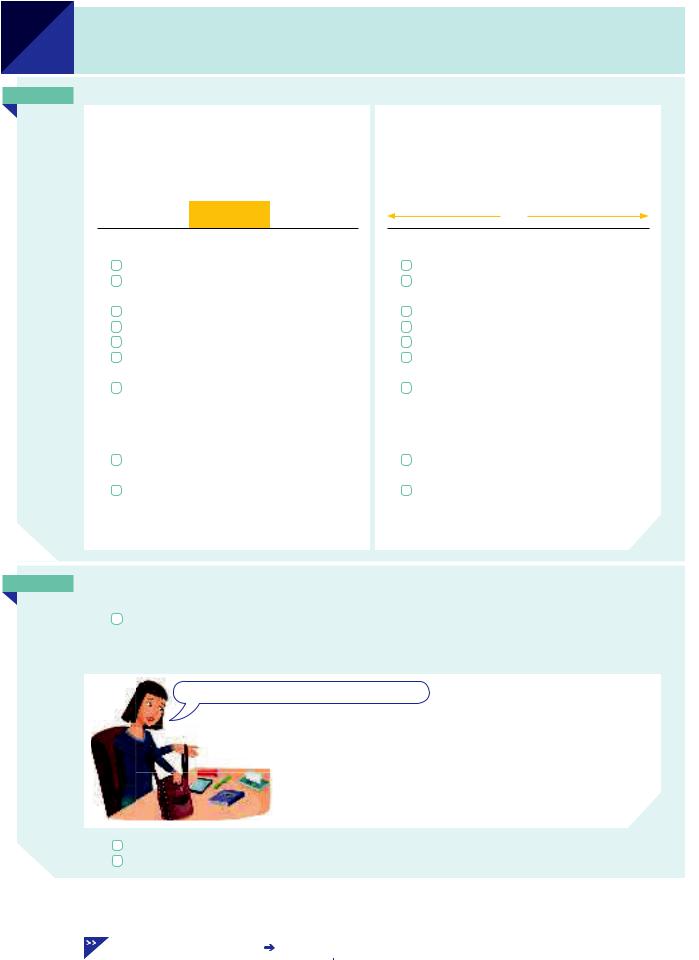
Unit
3
A
Present continuous and present simple 1 (I am doing and I do)
Compare:
present continuous (I am doing)
We use the continuous for things happening at or around the time of speaking.
The action is not complete.
I am doing
past |
now |
future |
The water is boiling. Be careful. Listen to those people. What language are they speaking?
Let’s go out. It isn’t raining now. ‘I’m busy.’ ‘What are you doing?’ I’m getting hungry. Let’s go and eat. Kate wants to work in Italy, so she’s learning Italian.
The population of the world is increasing very fast.
We use the continuous for temporary situations (things that continue for a short time):
I’m living with some friends until I find a place of my own.
a: You’re working hard today. b: Yes, I have a lot to do.
See Unit 1 for more information.
present simple (I do)
We use the simple for things in general or things that happen repeatedly.
I do
past now future
Water boils at 100 degrees Celsius.
Excuse me, do you speak English?
It doesn’t rain very much in summer. What do you usually do at weekends? I always get hungry in the aternoon.
Most people learn to swim when they are children.
Every day the population of the world increases by about 200,000 people.
We use the simple for permanent situations (things that continue for a long time):
My parents live in London. They have lived there all their lives.
Joe isn’t lazy. He works hard most of the time.
See Unit 2 for more information.
BI always do and I’m always doing
I always do something = I do it every time:
I always go to work by car. (not I’m always going)
I’m always doing something = I do it too oten or more oten than normal. For example:
I’ve lost my keys again. I’m always losing them.
I’m always losing them = I lose them too ot en, or more ot en than normal.
Paul is never satisfied. He’s always complaining. (= he complains too much) You’re always looking at your phone. Don’t you have anything else to do?
6 |
HowPresentlongcontinuoushave youand(been)simple… ?2 Unit114 Present tenses for the future Unit 19 |
|
|
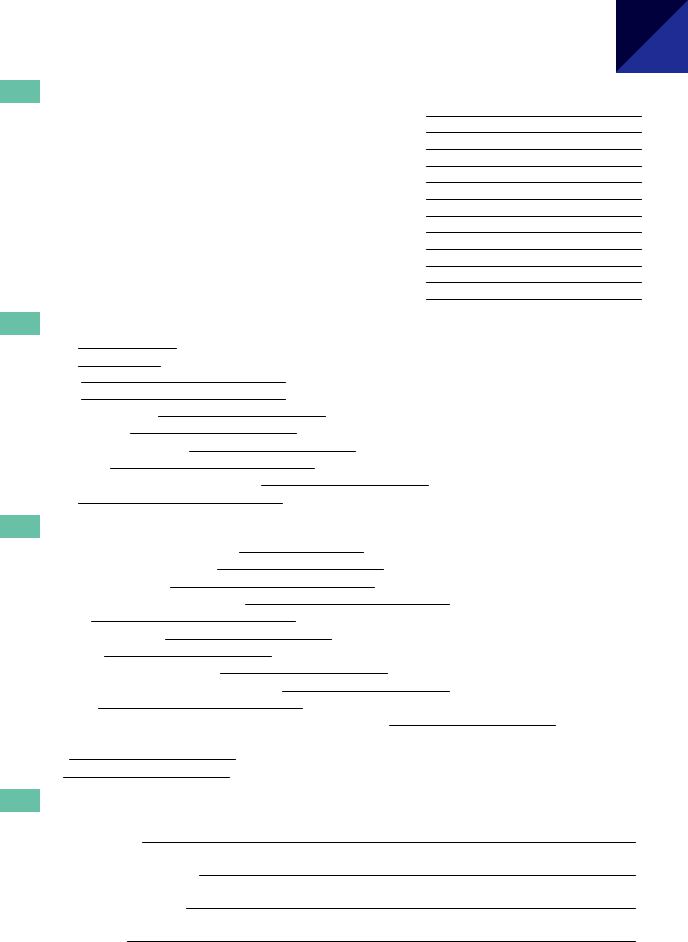
Exercises
3.1Are the underlined verbs OK? Correct them where necessary.
1 Water boils at 100 degrees Celsius.
2 |
How oten are you going to the cinema? |
3 |
Ben tries to find a job, but he hasn’t had any luck yet. |
4 |
Martina is phoning her mother every day. |
5 |
The moon goes round the earth in about 27 days. |
6 |
Can you hear those people? What do they talk about? |
7 |
What do you do in your spare time? |
8 |
Sarah is a vegetarian. She doesn’t eat meat. |
9 |
I must go now. It gets late. |
10 |
‘Come on! It’s time to leave.’ ‘OK, I come.’ |
11Paul is never late. He’s always starting work on time.
12They don’t get on well. They’re always arguing.
OK
do you go
Unit
3
3.2Put the verb into the correct form, present continuous or present simple.
1 |
a |
I usually get (I / usually / get) hungry in the aternoon. |
|
|
b |
I’m getting (I / get) hungry. Let’s go and eat something. |
|
2 |
a |
‘ |
(you / listen) to the radio?’ ‘No, you can turn it of.’ |
|
b ‘ |
(you / listen) to the radio a lot?’ ‘No, not very oten.’ |
|
3 |
a |
The River Nile |
(flow) into the Mediterranean. |
|
b The river |
(flow) very fast today – much faster than usual. |
|
4 |
a |
I’m not very active. |
(I / not / do) any sport. |
|
b What |
(you / usually / do) at weekends? |
|
5 |
a |
Rachel is in New York right now. |
(She / stay) at the Park Hotel. |
|
b |
|
(She / always / stay) there when she’s in New York. |
3.3Put the verb into the correct form, present continuous or present simple.
1 |
Why are all these people here? What’s happening (What / happen)? |
|
2 |
Julia is good at languages. |
(She / speak) four languages very well. |
3 |
Are you ready yet? |
(Everybody / wait) for you. |
4 |
I’ve never heard this word. How |
(you / pronounce) it? |
5 |
Kate |
(not / work) this week. She’s on holiday. |
6 |
I think my English |
(improve) slowly. It’s better than it was. |
7 |
Nicola |
(live) in Manchester. She has never lived anywhere else. |
8 |
Can we stop walking soon? |
(I / start) to get tired. |
9 |
Sam and Tina are in Madrid right now. |
(They / visit) a friend of theirs. |
10 |
‘What |
(your father / do)?’ ‘He’s an architect.’ |
11It took me an hour to get to work this morning. Most days (it / not / take) so long.
12 I
3.4Finish B’s sentences. Use always -ing.
1 |
a: I’ve lost my keys again. |
|
|
b: Not again! You’re always losing your keys |
. |
2 |
a: The car has broken down again. |
|
|
b: That car is useless. It |
. |
3 |
a: Look! You’ve made the same mistake again. |
|
|
b: Oh no, not again! I |
. |
4 |
a: Oh, I’ve let my phone at home again. |
|
|
b: Typical! |
. |
7
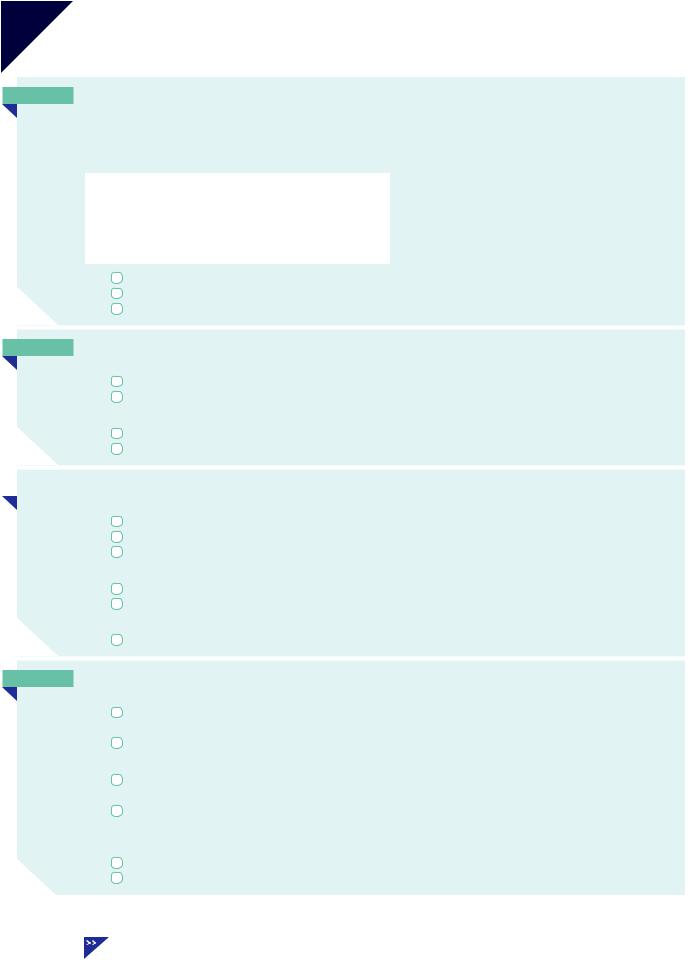
|
Unit |
|
|
Present continuous and present simple 2 |
|
|
4 |
(I am doing and I do) |
|
|
|
|
|
|
AWe use continuous forms (I’m waiting, it’s raining etc.) for actions and happenings that have started but not finished.
Some verbs (for example, know and like) are not normally used in this way. We don’t say ‘I am knowing’, ‘they are liking’. We say ‘I know’, ‘they like’.
The following verbs are not normally used in the present continuous:
like |
want |
need |
|
prefer |
|
|
|
|
|
||
know |
realise |
understand |
recognise |
||
|
|
|
|
||
believe |
suppose |
remember |
mean |
||
|
|
|
|
|
|
belong |
fit |
contain |
consist |
seem |
|
|
|
|
|
|
|
I’m hungry. I want something to eat. (not I’m wanting)
Do you understand what I mean?
Anna doesn’t seem very happy right now.
Bthink
When think means ‘believe’ or ‘have an opinion’, we do not use the continuous:
I think Mary is Canadian, but I’m not sure. (not I’m thinking)
What do you think of my idea? (= what is your opinion?)
When think means ‘consider’, the continuous is possible:
I’m thinking about what happened. I oten think about it.
Nicky is thinking of giving up her job. (= she is considering it)
C |
see |
hear |
smell |
taste |
look |
feel |
|
We normally use the present simple (not continuous) with see/hear/smell/taste: |
|||||
|
|
Do you see that man over there? (not are you seeing) |
||||
|
|
The room smells. Let’s open a window. |
|
|||
|
|
This soup doesn’t taste very good. |
|
|||
|
You can use the present simple or continuous to say how somebody looks or feels now: |
|||||
|
|
You look well today. or You’re looking well today. |
||||
|
|
How do you feel now? or |
How are you feeling now? |
|||
|
but |
|
|
|
|
|
I usually feel tired in the morning. (not I’m usually feeling)
Dam/is/are being
You can say he’s being …, you’re being … etc. to say how somebody is behaving now:
I can’t understand why he’s being so selfish. He isn’t usually like that. (being selfish = behaving selfishly now)
‘The path is icy. Don’t slip.’ ‘Don’t worry. I’m being very careful.’
Compare:
He never thinks about other people. He’s very selfish. (= he is selfish generally, not only now)
I don’t like to take risks. I’m a very careful person.
We use am/is/are being to say how a person is behaving (= doing something they can control) now. It is not usually possible in other situations:
Sam is ill. (not is being ill)
Are you tired? (not are you being tired)
8 |
Present continuous and simple 1 Unit 3 have Unit 17 Present tenses for the future Unit 19 |
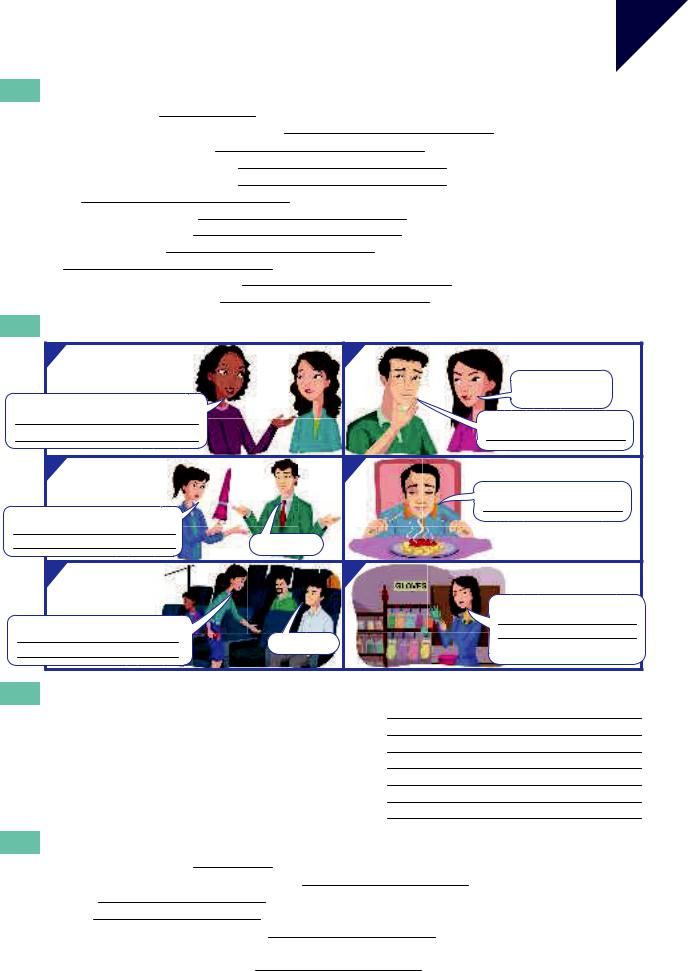
Exercises |
Unit |
4 |
|
|
|
4.1Put the verb into the correct form, present continuous or present simple.
1 |
Are you hungry? Do you want |
(you / want) something to eat? |
|
2 |
Alan says he’s 90 years old, but nobody |
(believe) him. |
|
3 |
She told me her name, but |
|
(I / not / remember) it now. |
4 |
Don’t put the dictionary away. |
|
(I / use) it. |
5 |
Don’t put the dictionary away. |
|
(I / need) it. |
6 |
Air |
|
(consist) mainly of nitrogen and oxygen. |
7 |
Who is that man? What |
|
(he / want)? |
8 |
Who is that man? Why |
|
(he / look) at us? |
9 |
Who is that man? |
|
(you / recognise) him? |
10 |
|
(I / think) of selling my car. Would you be interested in buying it? |
|
11 |
I can’t make up my mind. What |
|
(you / think) I should do? |
12 |
Gary wasn’t well earlier, but |
|
(he / seem) OK now. |
4.2Use the words in brackets to make sentences.
1 |
|
2 |
|
|
Are you OK? |
(you / not / seem / very happy today) |
|
You look worried. |
|
|
|
You don’t seem very |
|
(I / think) |
happy today. |
|
|
3 |
|
4 |
|
|
(this / smell / good) |
(who / this umbrella / belong to?) |
|
|
|
I’ve no idea. |
|
5 |
|
6 |
|
|
(these gloves / not / fit / me) |
Excuse me. (anybody / sit / there?) |
|
|
|
No, it’s free. |
They’re too small. |
|
|
4.3Are the underlined verbs OK? Correct them where necessary.
1 Nicky is thinking of giving up her job.
2 It’s not true. I’m not believing it.
3 I’m feeling hungry. Is there anything to eat?
4 I’ve never eaten that fruit. What is it tasting like?
5 I’m not sure what she does. I think she works in a shop. 6 Look over there. What are you seeing?
7 You’re very quiet. What are you thinking about?
OK
I don’t believe it.
4.4Complete the sentences. Use is/are being (continuous) or is/are (simple).
1 |
I can’t understand why he’s being |
so selfish. He isn’t usually like that. |
|
2 |
You’ll like Sophie when you meet her. She |
very nice. |
|
3 |
Sarah |
very nice to me at the moment. I wonder why. |
|
4 |
They |
very happy. They’ve just got married. |
|
5 |
You’re normally very patient, so why |
|
so unreasonable about waiting |
|
ten more minutes? |
|
|
6 |
Would you like something to eat? |
|
hungry? |
9
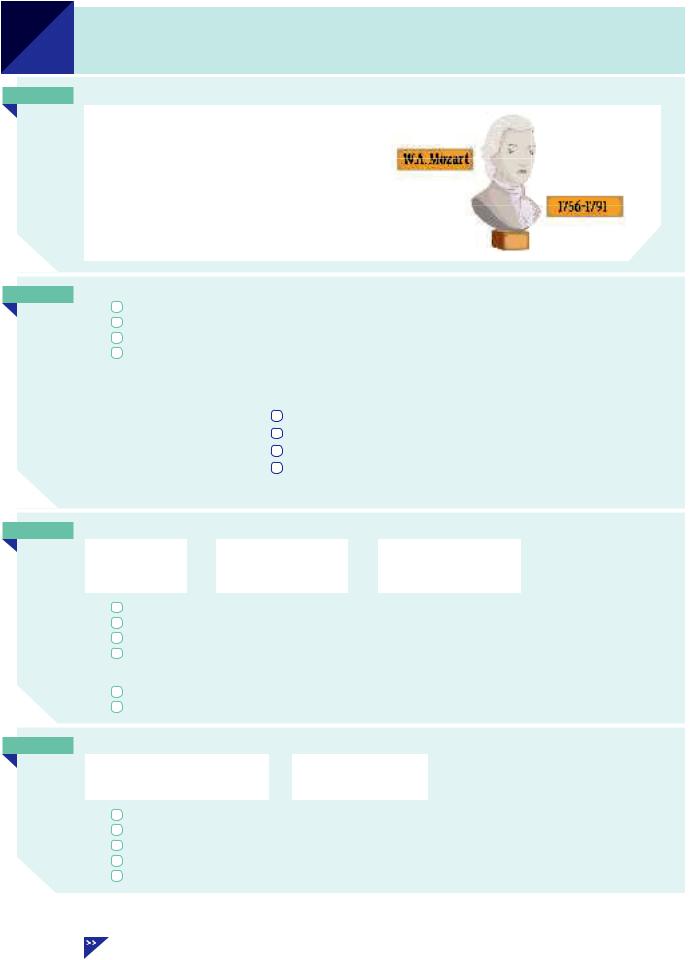
Unit
5Past simple (I did)
AStudy this example:
Wolfgang Amadeus Mozart was an Austrian musician and composer. He lived from 1756 to 1791. He started composing at the age of five and wrote more than 600 pieces of music.
He was only 35 years old when he died.
lived/started/wrote/was/died are all past simple
BVery oten the past simple ends in -ed (regular verbs):
I work in a travel agency now. Before that I worked in a department store.
They invited us to their party, but we decided not to go.
The police stopped me on my way home last night.
Laura passed her exam because she studied very hard.
For spelling (stopped, studied etc.), see Appendix 6.
But many verbs are irregular. The past simple does not end in -ed. For example:
write |
→ wrote |
Mozart wrote more than 600 pieces of music. |
see |
→ saw |
We saw Alice in town a few days ago. |
go |
→ went |
I went to the cinema three times last week. |
shut |
→ shut |
It was cold, so I shut the window. |
For a list of irregular verbs, see Appendix 1.
CIn questions and negative sentences we use did/didn’t + infinitive (enjoy/see/go etc.):
I |
enjoyed |
|
|
you |
enjoy? |
|
I |
|
enjoy |
she |
saw |
|
did |
she |
see? |
|
she |
didn’t |
see |
they |
went |
|
|
they |
go? |
|
they |
|
go |
|
|
|
|
|
|
|
|
|
|
I enjoyed the party a lot. Did you enjoy it?
How many people did they invite to the wedding?
I didn’t buy anything because I didn’t have any money. ‘Did you go out?’ ‘No, I didn’t.’
Sometimes do is the main verb in the sentence (did you do?, I didn’t do):
What did you do at the weekend? (not What did you at the weekend?) I didn’t do anything. (not I didn’t anything)
DThe past of be (am/is/are) is was/were:
I/he/she/it |
was/wasn’t |
|
was |
I/he/she/it? |
|
|
|
|
|
we/you/they |
were/weren’t |
|
were |
we/you/they? |
|
|
|
|
|
I was annoyed because they were late.
Was the weather good when you were on holiday?
They weren’t able to come because they were so busy.
I wasn’t hungry, so I didn’t eat anything.
Did you go out last night or were you too tired?
10 |
Past simple and past continuous Unit 6 Past simple and present perfect Units 12–14 |
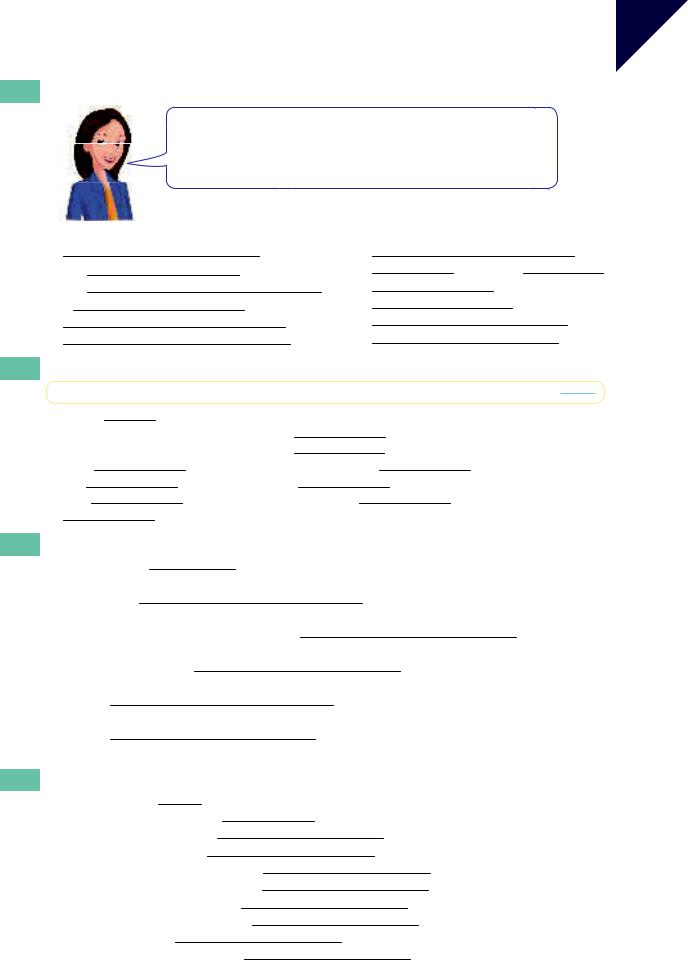
Exercises |
Unit |
5 |
|
|
|
5.1Read what Laura says about a typical working day:
I usually get up at 7 o’clock and have a big breakfast. I walk to work, which takes me about half an hour. I start work at 8.45. I never have lunch. I finish work at 5 o’clock. I’m always tired when I get home. I usually cook a meal in the evening. I don’t usually go out. I go to bed at about 11 o’clock, and I always sleep well.
LAURA
Yesterday was a typical working day for Laura. Write what she did or didn’t do yesterday.
1 |
She got up |
at 7 o’clock. |
7 |
|
at 5 o’clock. |
2 |
She |
a big breakfast. |
8 |
tired when |
home. |
3 |
She |
. |
9 |
a meal yesterday evening. |
|
4 |
It |
to get to work. |
10 |
out yesterday evening. |
|
5 |
|
at 8.45. |
11 |
|
at 11 o’clock. |
6 |
|
lunch. |
12 |
|
well last night. |
5.2Complete the sentences using the following verbs in the correct form:
|
buy |
catch |
cost |
fall |
hurt |
sell |
spend |
teach |
throw |
write |
|
1 |
Mozart |
wrote |
more than 600 pieces of music. |
|
|
|
|
|
|||
2 |
‘How did you learn to drive?’ ‘My father |
|
|
me.’ |
|
|
|
||||
3 |
We couldn’t af ord to keep our car, so we |
|
|
it. |
|
|
|
||||
4 |
Dave |
|
down the stairs this morning and |
|
|
his leg. |
|
||||
5 |
Joe |
|
the ball to Sue, who |
|
|
it. |
|
|
|
||
6 |
Kate |
|
a lot of money yesterday. She |
|
|
a dress which |
|
||||
|
|
|
£100. |
|
|
|
|
|
|
|
|
5.3You ask James about his holiday in the US. Write your questions.
1 |
YOU: |
Where did you go ? |
|
|
JaMES: |
To the US. We went on a trip from San Francisco to Denver. |
|
2 |
YOU: |
How |
? By car? |
|
JaMES: |
Yes, we hired a car in San Francisco. |
|
3 |
YOU: |
It’s a long way to drive. How long |
? |
|
JaMES: |
Two weeks. We stopped at a lot of places along the way. |
|
4 |
YOU: |
Where |
? In hotels? |
|
JaMES: |
Yes, small hotels or motels. |
|
5 |
YOU: |
|
good? |
|
JaMES: |
Yes, but it was very hot – sometimes too hot. |
|
6 |
YOU: |
|
the Grand Canyon? |
|
JaMES: |
Of course. It was wonderful. |
|
5.4Complete the sentences. Put the verb into the correct form, positive or negative.
1 |
It was warm, so I took of my coat. (take) |
|
2 |
The film wasn’t very good. I didn’t enjoy |
it much. (enjoy) |
3 |
I knew Sarah was busy, so I |
her. (disturb) |
4 |
We were very tired, so we |
the party early. (leave) |
5 |
It was hard carrying the bags. They |
really heavy. (be) |
6 |
The bed was very uncomfortable. I |
well. (sleep) |
7 |
This watch wasn’t expensive. It |
much. (cost) |
8 |
The window was open and a bird |
into the room. (fly) |
9 |
I was in a hurry, so I |
time to call you. (have) |
10 |
I didn’t like the hotel. The room |
very clean. (be) |
11
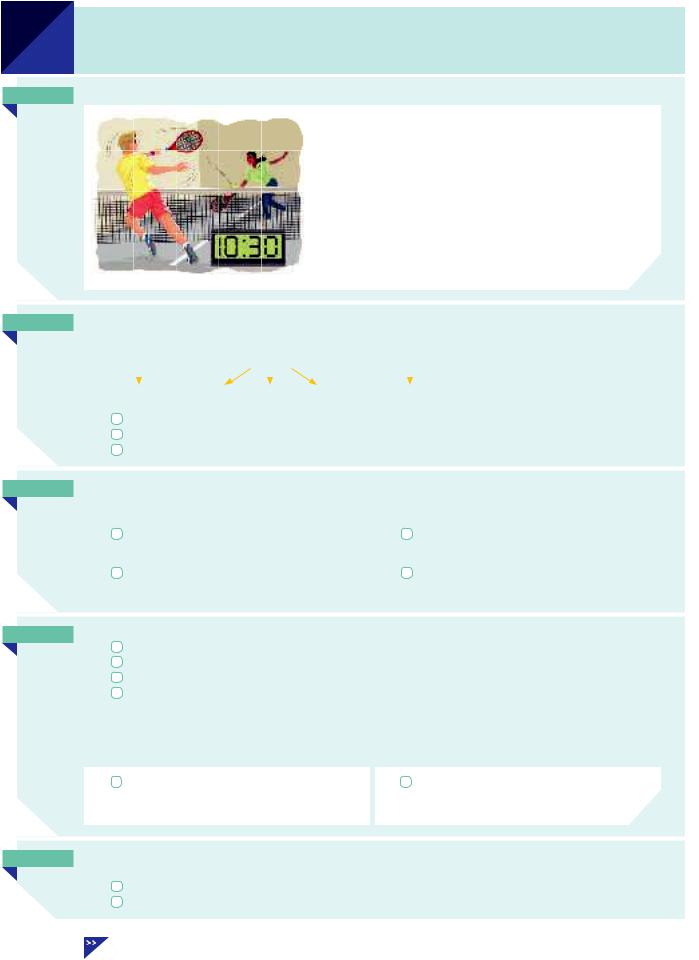
Unit
6Past continuous (I was doing)
AStudy this example situation:
Yesterday Karen and Joe played tennis. They started at 10 o’clock and finished at 11.30.
So, at 10.30 they were playing tennis.
they were playing =
they were in the middle of playing, they had not finished
was/were + -ing is the past continuous:
he/she/it |
was |
playing |
|
|
|
doing |
|
we/you/they |
were |
||
working etc. |
|||
|
|
|
BI was doing something = I was in the middle of doing it at a certain time. The action or situation started
before this time, but had not finished:
I started doing |
I was doing |
I finished doing |
|
|
|||
|
|
|
|
|
|
|
|
|
|
|
|
|
|
|
|
|
|
|
|
|
|
|
|
|
|
|
|
|
|
|
|
past |
|
|
past |
now |
|||
This time last year I was living in Hong Kong.
What were you doing at 10 o’clock last night?
I waved to Helen, but she wasn’t looking.
CCompare I was doing (past continuous) and I did (past simple):
|
|
|
I was doing (= in the middle of an action) |
|
I did (= complete action) |
We were walking home when I met |
|
We walked home ater the party last |
Dan. (in the middle of walking home) |
|
night. (= all the way, completely) |
Kate was watching TV when we |
|
Kate watched TV a lot when she was ill |
arrived. |
|
last year. |
|
|
|
|
|
|
DYou can say that something happened (past simple) in the middle of something else (past continuous):
Matt phoned while we were having dinner.
It was raining when I got up.
I saw you in the park yesterday. You were sitting on the grass and reading a book.
I hurt my back while I was working in the garden.
But we use the past simple to say that one thing happened at er another:
 I was walking along the road when I saw Dan. So I stopped, and we talked for a while. Compare:
I was walking along the road when I saw Dan. So I stopped, and we talked for a while. Compare:
When Karen arrived, we were having dinner. (= we had already started before she arrived)
When Karen arrived, we had dinner. (= Karen arrived, and then we had dinner)
ESome verbs (for example, know and want) are not normally used in continuous forms (is + -ing,
was + -ing etc.). See Unit 4A for a list of these verbs.
We were good friends. We knew each other well. (not we were knowing) I was enjoying the party, but Chris wanted to go home. (not was wanting)
12 |
Past simple (I did) Unit 5 |
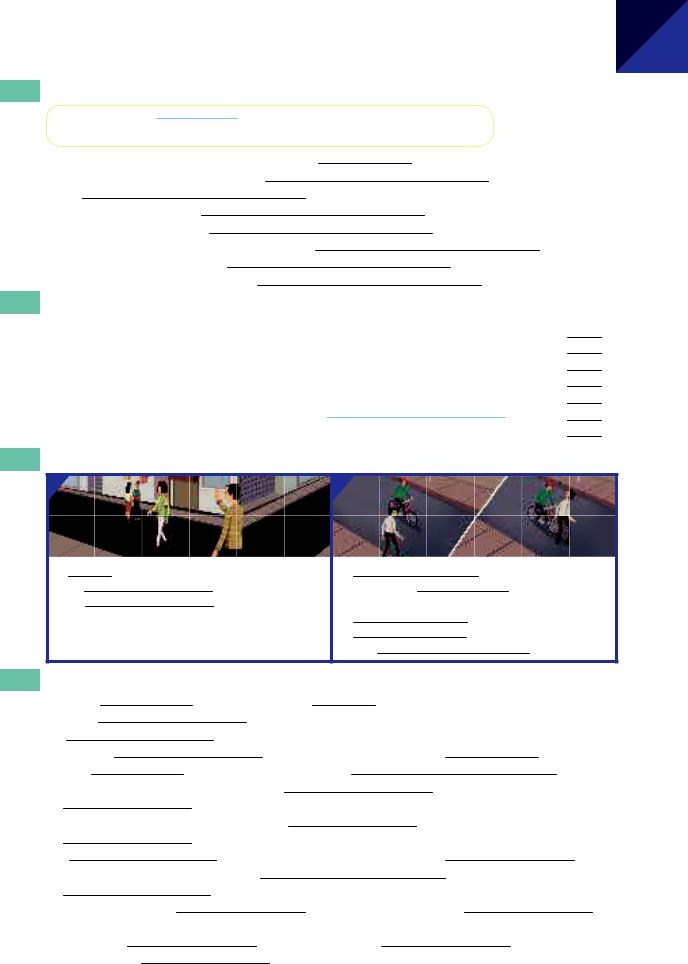
Exercises
6.1Complete the sentences. Choose from:
|
was looking |
was wearing |
wasn’t listening |
weren’t looking |
|
was snowing |
was working |
were sitting |
were you going |
1 |
Today Helen is wearing a skirt. Yesterday she was wearing trousers. |
|||
2 |
‘What did he say?’ ‘I don’t know. I |
|
.’ |
|
3 |
We |
|
at the back of the theatre. We couldn’t hear very well. |
|
4 |
This time last year Steve |
|
on a farm. |
|
5 |
They didn’t see me. They |
|
in my direction. |
|
6 |
The weather was bad. It was very cold and it |
. |
||
7 |
I saw you in your car. Where |
|
? |
|
8 |
I saw Kate a few minutes ago. She |
|
for you. |
|
6.2Which goes with which?
Unit
6
1 |
When I got to the cafe |
|
a when she was living in Rome. |
1 |
f |
|
2 |
We fell asleep |
|
b |
she was working in a clothes shop. |
2 |
|
3 |
Amy learnt Italian |
|
c |
when I was driving home. |
3 |
|
4 |
Tom didn’t come out with us |
|
d |
but nobody was watching it. |
4 |
|
5 |
The car began to make a strange noise |
|
e |
while we were watching a film. |
5 |
|
6 |
The TV was on |
|
f |
my friends were waiting for me. |
6 |
|
7 |
When I first met Jessica |
|
g because he wasn’t feeling well. |
7 |
|
|
|
|
|
|
|
|
|
6.3Put the verb into the correct form, past continuous or past simple.
1
I saw she She
2
SUE |
|
|
(see) Sue in town yesterday, but |
I |
(cycle) home yesterday |
(not/see) me. |
when a man |
(step) out into the |
(look) the other way. |
road in front of me. |
|
|
I |
(go) quite fast, but luckily |
|
I |
(manage) to stop in time, |
|
and I |
(not/hit) him. |
6.4Put the verb into the correct form, past continuous or past simple.
1 |
Jenny was waiting |
(wait) for me when I arrived |
(arrive). |
|
2 |
‘What |
(you / do) at this time yesterday?’ |
‘I was asleep.’ |
|
3 |
‘ |
(you / go) out last night?’ |
‘No, I was too tired.’ |
|
4 |
How fast |
(you / drive) when the accident |
(happen)? |
|
5 |
Sam |
(take) a picture of me while I |
|
(not / look). |
6 |
We were in a very dif icult position. We |
(not / know) what to do, so we |
||
|
|
(do) nothing. |
|
|
7 |
I haven’t seen Alan for ages. When I last |
(see) him, he |
||
|
|
(try) to find a job. |
|
|
8 |
I |
(walk) along the street when suddenly I |
(hear) |
|
|
something behind me. Somebody |
|
(follow) me. I was scared and I |
|
|
|
(start) to run. |
|
|
9 |
When I was young, I |
(want) to be a pilot. Later I |
||
|
(change) my mind. |
|
|
|
10 |
Last night I |
(drop) a plate when I |
(do) the washing up. |
|
|
Fortunately it |
(not / break). |
|
|
Additional exercise 1 (page 302) |
13 |
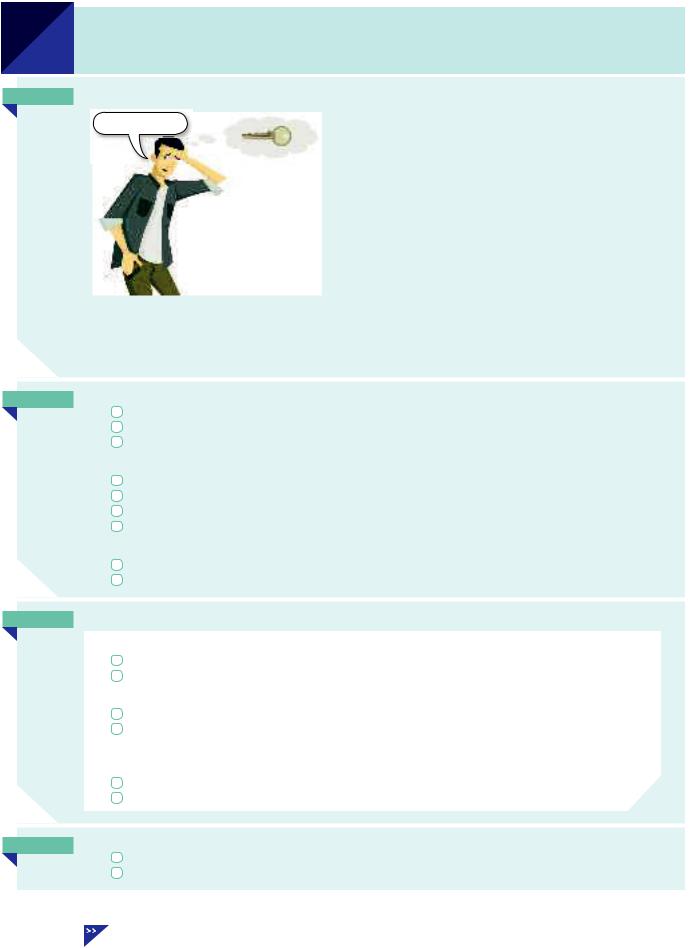
Unit
7Present perfect 1 (I have done)
AStudy this example situation:
I’ve lost my key. |
Tom can’t find his key. |
|
|
|
|
He’s lost his key. (= He has lost …) |
|
|
|
|
he has lost his key = |
|
|
|
|
he lost it and he doesn’t have it now |
|
|
|
|
have lost / has lost is the present perfect simple: |
|||
|
|
|
|
|
|
I/we/they/you |
have (= I’ve etc.) |
finished |
|
|
|
|
lost |
|
|
he/she/it |
has (= he’s etc.) |
done |
|
|
been etc. |
|
||
|
|
|
|
|
|
|
|
|
|
|
|
|
|
|
The present perfect simple is have/has + past participle. The past participle oten ends in -ed
(finished/decided etc.), but many verbs are irregular (lost/done/written etc.).
For a list of irregular verbs, see Appendix 1.
BWhen we say ‘something has happened’, this is usually new information:
Ow! I’ve cut my finger.
The road is closed. There’s been an accident. (= There has been …)
Police have arrested two men in connection with the robbery.
When we use the present perfect, there is a connection with now. The action in the past has a result now:
Tom has lost his key. (= he doesn’t have it now)
He told me his name, but I’ve forgotten it. (= I can’t remember it now)
Sally is still here. She hasn’t gone out. (= she is here now)
I can’t find my bag. Have you seen it? (= do you know where it is now?)
Compare gone (to) and been (to):
James is on holiday. He has gone to Italy. (= he is there now or on his way there) Amy is back home now. She has been to Italy. (= she has now come back)
CYou can use the present perfect with just, already and yet.
Just = a short time ago:
‘Are you hungry?’ ‘No, I’ve just had lunch.’ Hello. Have you just arrived?
Already = sooner than expected: |
|
‘Don’t forget to pay the bill.’ |
‘I’ve already paid it.’ |
‘What time is Mark leaving?’ |
‘He’s already let.’ |
Yet = until now. We use yet to show that we are expecting something to happen.
We use yet in questions and negative sentences:
Has it stopped raining yet?
I’ve written the email, but I haven’t sent it yet.
DYou can also use the past simple (did, went, had etc.) in the examples on this page. So you can say:
Ben isn’t here. He’s gone out. or He went out.
‘Are you hungry?’ ‘No, I’ve just had lunch.’ or ‘No, I just had lunch.’
|
Present perfect Units 8, 11 been to Units 8A, 126A Present perfect continuous Units 9–10 |
14 |
Present perfect and past Units 12–14 yet and already Unit 111 American English Appendix 7 |
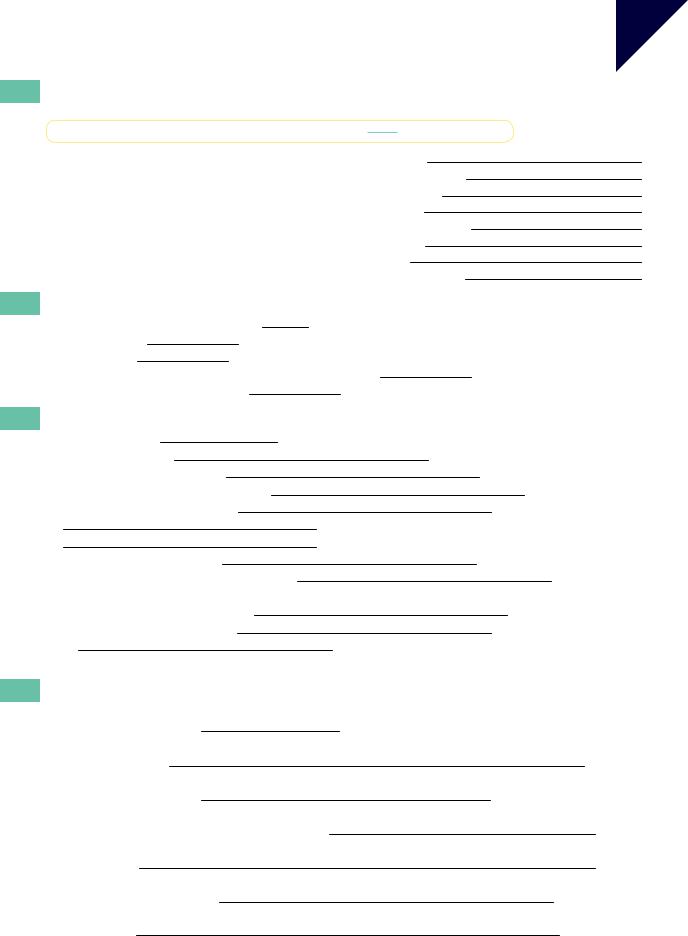
Exercises |
Unit |
7 |
|
|
|
7.1Read the situations and complete the sentences using the present perfect. Choose from these verbs:
|
break disappear go up grow improve |
lose |
shrink stop |
1 |
Tom is looking for his key. He can’t find it. |
|
Tom has lost his key. |
2 |
Maria’s English wasn’t very good. Now it is better. |
|
Her English |
3 |
My bag was here, but it isn’t here any more. |
|
My bag |
4 |
Lisa can’t walk and her leg is in plaster. |
|
Lisa |
5 |
Last week the bus fare was £1.80. Now it is £2. |
|
The bus fare |
6 |
Dan didn’t have a beard before. Now he has a beard. |
|
Dan |
7 |
It was raining ten minutes ago. It isn’t raining now. |
|
It |
8 |
I washed my sweater, and now it’s too small for me. |
|
My sweater |
7.2Put in been or gone.
1 |
My parents are on holiday. They’ve gone |
to Italy. |
|
|
2 |
Hello! I’ve just |
to the shops. I’ve bought lots of things. |
|
|
3 |
Tom has just |
out. He’ll be back in about an hour. |
|
|
4 |
Alice isn’t here at the moment. I don’t know where she’s |
. |
||
5 |
You’re very late. Where have you |
? |
|
|
7.3Complete the sentences using the present perfect.
1 |
Sally is still here. She hasn’t gone |
(she / not / go) out. |
2 |
I can’t find my bag. |
(you / see / it) anywhere? |
3 |
I can’t log on to the website. |
(I / forget) my password. |
4 |
I sent Joe an email this morning, but |
(he / not / reply). |
5 |
Is the meeting still going on, or |
(it / finish)? |
6 |
|
(the weather / change). It’s colder now. |
7 |
|
(you / not / sign) the form. Could you sign it now, please? |
8 |
Are your friends still here, or |
(they / go) home? |
9Paul doesn’t know what he’s going to do. (he / not / decide / yet).
10 |
‘Do you know where Julia is?’ |
‘Yes, |
(I / just / see / her).’ |
11 |
‘When is David going away?’ |
‘ |
(he / already / go).’ |
12 |
a: |
|
(your course / start / yet)? |
b:Not yet. It starts next week.
7.4Read the situations and write sentences with just, already or yet.
1 Ater lunch you go to see a friend at her house. She says, ‘Would you like something to eat?’
|
You say: No thank you. I’ve just had lunch |
. (have lunch) |
2 |
Joe goes out. Five minutes later, the phone rings and the caller says, ‘Can I speak to Joe?’ |
|
|
You say: I’m afraid |
. (go out) |
3 |
You are eating in a restaurant. The waiter thinks you have finished and starts to take your plate away. |
|
|
You say: Wait a minute! |
. (not / finish) |
4 |
You plan to eat at a restaurant tonight. You phone to reserve a table. Later your friend says, |
|
|
‘Shall I phone to reserve a table?’ You say: No, |
. (do it) |
5 |
You know that Lisa is looking for a place to live. Perhaps she has been successful. |
|
|
You ask her: |
? (find) |
6 |
You are still thinking about where to go for your holiday. A friend asks, ‘Where are you going |
|
|
for your holiday?’ You say: |
. (not / decide) |
7 |
Laura went out, but a few minutes ago she returned. Somebody asks, ‘Is Laura still out?’ |
|
|
You say: No, |
. (come back) |
15
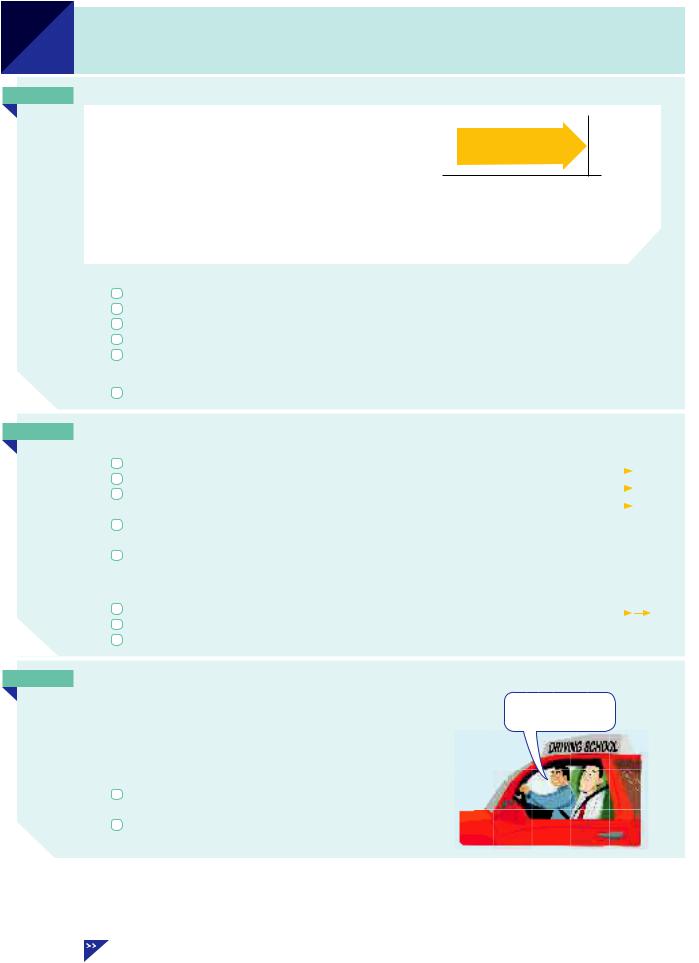
Unit
8Present perfect 2 (I have done)
AStudy this example conversation:
DaVE: |
Have you travelled a lot, Jane? |
JaNE: |
Yes, I’ve been to lots of places. |
DaVE: |
Really? Have you ever been to China? |
JaNE: |
Yes, I’ve been to China twice. |
DaVE: |
What about India? |
JaNE: |
No, I haven’t been to India. |
Jane’s life |
|
(a period until now) |
|
past |
now |
When we talk about a period of time that continues from the past until now, we use the present perfect (have been / have travelled etc.). Here, Dave and Jane are talking about the places Jane has visited in her life, which is a period that continues until now.
In the same way we say:
Have you ever eaten caviar?
We’ve never had a car.
I don’t know what the film is about. I haven’t seen it.
Susan really loves that book. She’s read it three times. (She’s = She has)
It’s a really boring movie. It’s the most boring movie I’ve ever seen.
been (to) = visited:
I’ve never been to Canada. Have you been there?
BIn the following examples too, the speakers are talking about a period that continues until now
(recently, in the last few days, so far, since I arrived etc.):
Have you heard anything from Ben recently? |
|
|
|
|
recently |
|
|
|
|
|
|
||
I’ve met a lot of people in the last few days. |
|
|
|
|
|
|
|
|
|
|
|||
|
|
in the last few days |
|
|
|
|
|||||||
Everything is going well. There haven’t been any |
|
|
|
|
|
|
|||||||
|
|
|
|||||||||||
|
|
|
since I arrived |
|
|
|
|
|
|||||
problems so far. |
|
|
|
|
|
|
|
||||||
|
|
|
|
|
|||||||||
|
|
|
|
|
|
|
|
|
|
|
|
|
|
The weather is bad here. It’s (= It has) rained every |
|
|
|
|
|
|
|
|
|
|
|
|
|
|
|
|
|
|
|
|
|
|
|
|
|
|
|
past |
|
|
|
|
|
|
now |
||||||
day since I arrived. (= from when I arrived until now) |
|
|
|
|
|
|
|||||||
|
|
|
|
|
|
|
|
|
|
|
|
|
|
It’s good to see you again. We haven’t seen each other for a long time. |
|
|
|
|
|
|
|
|
|
|
|||
In the same way we use the present perfect with today, this evening, this year etc. when these |
|||||||||||||
periods are not finished at the time of speaking: |
|
|
|
|
|
|
|
|
|
|
|
|
|
|
|
|
|
|
|
|
|
|
|
|
|
|
|
I’ve drunk four cups of cof ee today. |
|
|
|
|
|
today |
|
|
|
||||
|
|
|
|
|
|
||||||||
Have you had a holiday this year? |
|
|
|
|
|
|
|
|
|
|
|
|
|
past |
|
|
|
|
|
|
now |
||||||
I haven’t seen Tom this morning. Have you? |
|
|
|
|
|
|
|||||||
|
|
|
|
|
|
|
|
|
|
|
|
|
|
C We say ‘It’s the (first) time something has happened’. For example: Don is having a driving lesson. It’s his first lesson.
We can say:
 It’s the first time he has driven a car. (not drives) or He hasn’t driven a car before.
It’s the first time he has driven a car. (not drives) or He hasn’t driven a car before.
or He has never driven a car before.
In the same way we say:
Sarah has lost her passport again. This is the second time this has happened. (not happens)
Andy is phoning his girlfriend again. It’s the third time he’s phoned her this evening.
This is the first time
I’ve driven a car.
16 |
Present perfect 1 Unit 7 Present perfect + for/since Units 11–12 Present perfect and past Units 12–14 |
|
|
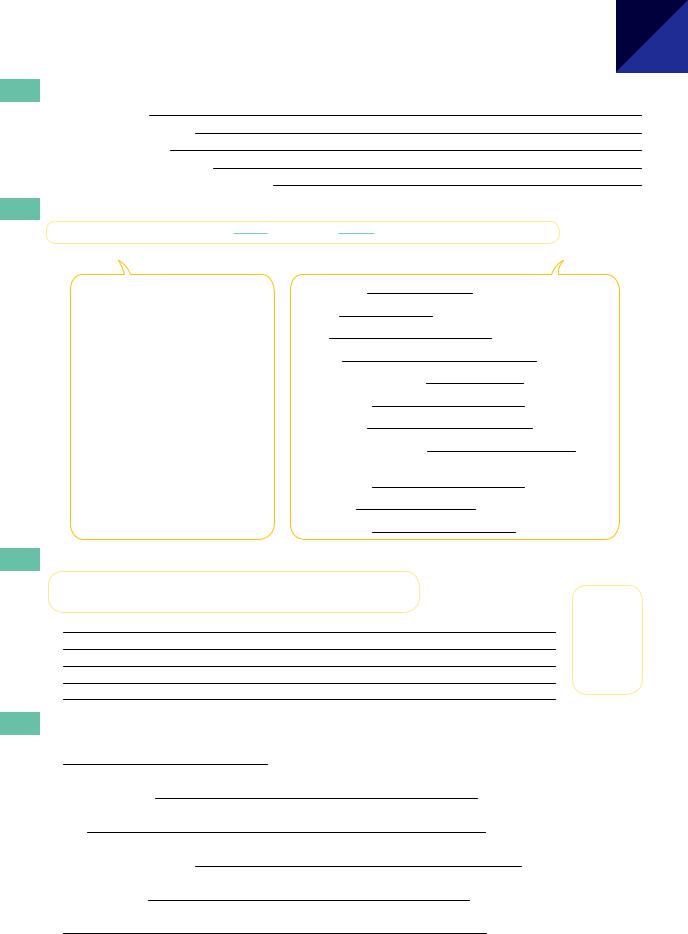
Exercises
8.1You ask people about things they have done. Write questions with ever.
1 (ride / horse?) Have you ever ridden a horse?
2 (be / California?) Have
3 (run / marathon?)
4 (speak / famous person?)
5 (most beautiful place / visit?) What’s
8.2Complete B’s answers. Some sentences are positive and some negative. Use these verbs:
be |
be eat happen |
have |
have |
meet |
play |
read |
see try |
|
A |
|
|
|
|
|
B |
1 |
What’s Mark’s sister like? |
I’ve no idea. |
I’ve never met |
her. |
|||
2 |
Is everything going well? |
Yes, we |
haven’t had |
any problems so far. |
|||
3 |
Are you hungry? |
Yes. I |
|
|
|
much today. |
|
4 |
Can you play chess? |
Yes, but |
|
|
|
for ages. |
|
5 |
Are you enjoying your holiday? |
Yes, it’s the best holiday |
|
for a long time. |
|||
6 |
What’s that book about? |
I don’t know. |
|
|
it. |
||
7 |
Is Brussels an interesting place? |
I’ve no idea. |
|
|
there. |
||
8 |
I hear your car broke down again |
Yes, it’s the second time |
|
|
|||
|
yesterday. |
this month. |
|
|
|
||
9 |
Do you like caviar? |
I don’t know. |
|
|
it. |
||
10 |
Mike was late for work again today. |
Again? He |
|
|
late every day this week. |
||
11 |
Who’s that woman by the door? |
I don’t know. |
|
|
her before. |
||
Unit
8
8.3Write four sentences about yourself. Use I haven’t and choose from the boxes.
used a computer |
travelled by bus |
eaten any fruit |
been to the cinema |
read a book |
lost anything |
1I haven’t used a computer today.
2
3
4
5
8.4Read the situations and complete the sentences.
1 |
Jack is driving a car for the first time. He’s very nervous and not sure what to do. |
|
|
It’s the first time he’s driven |
a car. |
2 |
Some children at the zoo are looking at a girafe. They’ve never seen one before. |
|
|
It’s the first time |
a girafe. |
3 |
Sue is riding a horse. She doesn’t look very confident or comfortable. |
|
|
She |
before. |
4 |
Joe and Lisa are on holiday in Japan. They’ve been to Japan once before. |
|
|
This is the second time |
. |
5 |
Emily is staying at the Prince Hotel. She stayed there a few years ago. |
|
|
It’s not the first |
this hotel. |
6 |
Ben is playing tennis for the first time. He’s a complete beginner. |
|
|
|
before. |
today this week recently for ages since … this year
17
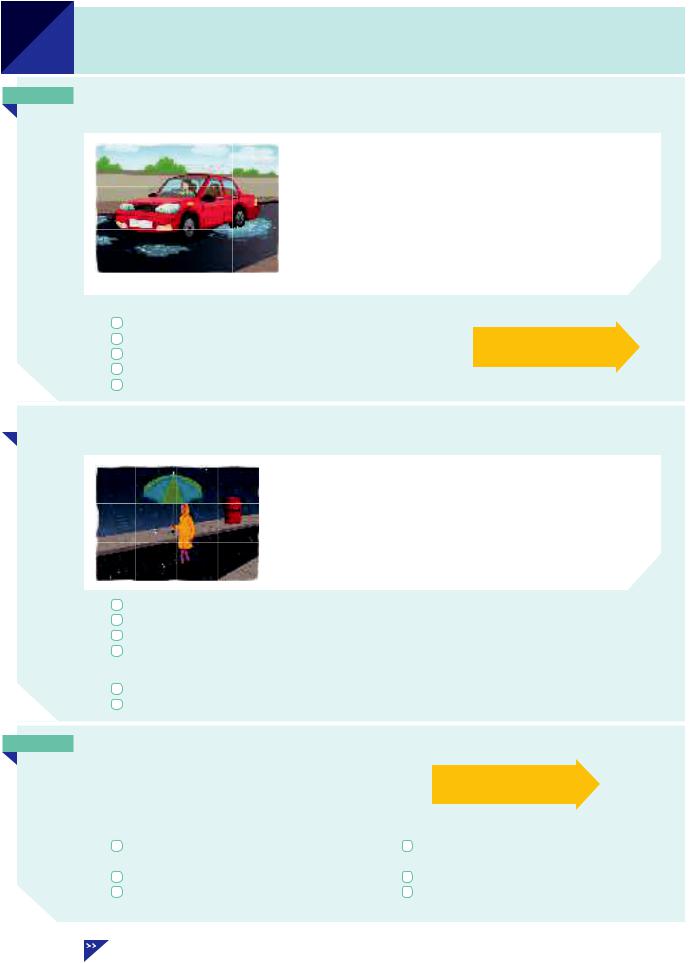
Unit
9Present perfect continuous (I have been doing)
AIt’s been raining.
Study this example situation:
Is it raining?
No, but the ground is wet.
It’s been raining. (= It has been …)
have/has been + -ing is the present perfect continuous:
I/we/they/you |
have |
(= I’ve etc.) |
|
doing |
|
been |
working |
||||
he/she/it |
has |
(= he’s etc.) |
|||
|
|
|
|
learning etc. |
We use the present perfect continuous for an activity that has recently stopped or just stopped:
|
Why are you out of breath? Have you been running? |
|
|
|
|
||
|
Paul is very tired. He’s been working hard. |
have/has been + -ing |
|
|
Why are you so tired? What have you been doing? |
present perfect continuous |
|
|
I’ve been talking to Amanda and she agrees with me. |
|
|
|
Where have you been? I’ve been looking for you. |
now |
|
|
|
|
|
B |
It’s been raining for two hours. |
|
|
|
Study this example situation: |
|
|
It began raining two hours ago and it is still raining.
How long has it been raining?
It’s been raining for two hours. (= It has been …)
We use the present perfect continuous in this way, especially with how long, for … and since … . The activity is still happening (as in this example) or has just stopped.
How long have you been learning English? (= you’re still learning English)
Ben is watching TV. He’s been watching TV all day.
Where have you been? I’ve been looking for you for the last half hour.
Chris hasn’t been feeling well recently.
You can use the present perfect continuous for repeated actions:
Silvia is a very good tennis player. She’s been playing since she was eight.
Every morning they meet in the same cafe. They’ve been going there for years.
CCompare I am doing and I have been doing:
|
|
|
|
|
|
|
|
|
|
|
|
|
|
|
|
|
|
|
|
|
|
I am doing |
|
|
I have been doing |
|
|
|
present continuous |
|
|
present perfect continuous |
|
|
|
|
|
|
|
|
|
|
now |
|
now |
|||
Don’t disturb me now. I’m working. |
|
I’ve been working hard. Now I’m going |
||||
|
|
|
|
|
to have a break. |
|
We need an umbrella. It’s raining. |
|
The ground is wet. It’s been raining. |
||||
Hurry up! We’re waiting. |
|
We’ve been waiting for an hour. |
||||
|
|
|
|
|
|
|
|
|
|
|
|
|
|
18 |
Present perfect continuous and simple Units 10–11 Present perfect + for/since Units 11–12 |
|
|
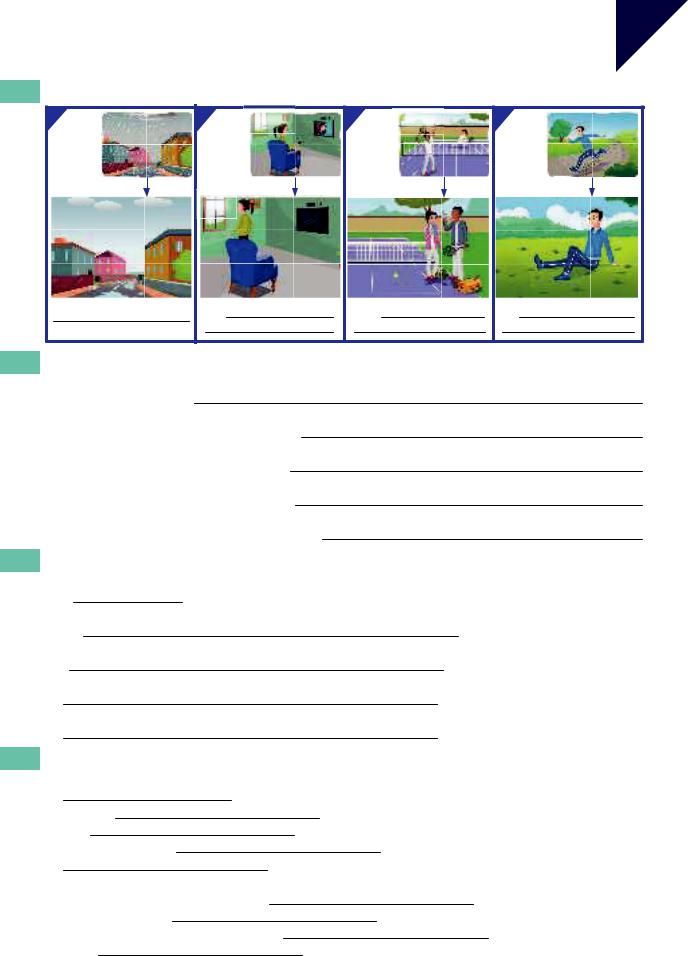
Exercises |
Unit |
9 |
|
|
|
9.1What have these people been doing or what has been happening?
1 |
earlier |
2 |
earlier |
3 |
earlier |
4 |
earlier |
|
|
|
|
||||
now |
|
now |
|
now |
|
now |
|
It’s |
been raining. |
She |
|
They |
|
He |
|
9.2Write a question for each situation.
1 |
You meet Kate as she is leaving the swimming pool. You say: |
|
Hi, Kate. (you / swim?) Have you been swimming? |
2 |
You have arrived a little late to meet Ben who is waiting for you. You say: |
|
I’m sorry I’m late, Ben. (you / wait / long?) |
3 |
Jane’s little boy comes into the house with a very dirty face and dirty hands. His mother says: |
|
Why are you so dirty? (what / you / do?) |
4 |
You are in a shop and see Anna. You didn’t know she worked there. You say: |
|
Hi, Anna. (how long / you / work / here?) |
5A friend tells you about his job – he sells phones. You say: You sell phones? (how long / you / do / that?)
9.3Read the situations and complete the sentences.
1 It’s raining. The rain started two hours ago.
|
It ’s been raining |
for two hours. |
2 |
We are waiting for the bus. We started waiting 20 minutes ago. |
|
|
We |
for 20 minutes. |
3 |
I’m learning Japanese. I started classes in December. |
|
|
I |
since December. |
4 |
Jessica is working in a hotel. She started working there on 18 January. |
|
|
|
since 18 January. |
5 |
Our friends always go to Italy for their holidays. The first time was years ago. |
|
|
|
for years. |
9.4Put the verb into the present continuous (am/is/are + -ing) or present perfect continuous (have/has been + -ing).
1 |
Maria has been learning |
(Maria / learn) English for two years. |
|
2 |
Hi, Tom. |
|
(I / look) for you. I need to ask you something. |
3 |
Why |
|
(you / look) at me like that? Stop it! |
4 |
Rachel is a teacher. |
|
(she / teach) for ten years. |
5 |
|
(I / think) about what you said and I’ve decided to take |
|
|
your advice. |
|
|
6 |
‘Is Paul on holiday this week?’ |
‘No, |
(he / work).’ |
7 |
Sarah is very tired. |
|
(she / work) very hard recently. |
8 |
It’s dangerous to use your phone when |
(you / drive). |
|
9 |
Laura |
|
(travel) in South America for the last three months. |
19
